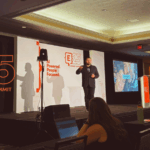While the precise impact of generative AI remains shrouded in a degree of mystery, what seems more certain is that it will continue to impact higher education. The debate is about ensuring that this impact is positive. For instance, the International Monetary Fund recently highlighted AI’s potential to exacerbate existing inequalities. For higher education, this translates into a pressing need to ensure AI enhances access to learning, fosters equitable outcomes and prepares students for a dramatically shifting job market.
During the 2024 IESE Alumni Conference, Rita Babihuga-Nsanze, chief economist at the Africa Finance Corporation, explored how AI could reshape global economies and local ecosystems. Her insights offered valuable lessons for higher education leaders navigating an era of rapid technological and societal change.



